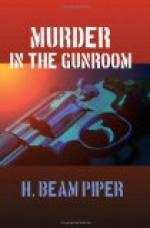“What do you collect, or don’t you specialize?”
“Pistols; I try to get the best possible specimens of the most important types, special emphasis on British arms after 1700 and American arms after 1800. What I’m interested in is the evolution of the pistol. I have a couple of wheel locks, to start with, and three miguelet-locks and an Italian snaphaunce. Then I have a few early flintlocks, and a number of mid-eighteenth-century types, and some late flintlocks and percussion types. And about twenty Colts, and so on through percussion revolvers and early cartridge types to some modern arms, including a few World War II arms.”
“I see; about the same idea Lane Fleming had,” Pierre said. “I collect personal combat-arms, firearms and edge-weapons. Arms that either influenced fighting techniques, or were developed to meet special combat conditions. From what you say, you’re mainly interested in the way firearms were designed and made; I’m interested in the conditions under which they were used. And Adam Trehearne, who’ll be here shortly, collects pistols and a few long-arms in wheel lock, proto-flintlock and early flintlock, to 1700. And Philip Cabot collects U.S. Martials, flintlock to automatic, and also enemy and Allied Army weapons from all our wars. And Colin MacBride collects nothing but Colts. Odd how a Scot, who’s only been in this country twenty years, should become interested in so distinctively American a type.”
“And I collect anything I can sell at a profit, from Chinese matchlocks to tommy-guns,” Karen Lawrence interjected, coming into the room with Dot Gresham.
Pierre grinned. “Karen is practically a unique specimen herself; the only general-antique dealer I’ve ever seen who doesn’t hate the sight of a gun-collector.”
“That’s only because I’m crazy enough to want to marry one,” the girl dealer replied. “Of all the miserly, unscrupulous, grasping characters ...” She expressed a doubt that the average gun-collector would pay more than ten cents to see his Lord and Savior riding to hounds on a Bren-carrier. “They don’t give a hoot whose grandfather owned what, and if anything’s battered up a little, they don’t think it looks quaint, they think it looks lousy. And they’ve never heard of inflation; they think arms ought still to sell for the sort of prices they brought at the old Mark Field sale, back in 1911.”
“What were you looking at?” Dot asked Rand, then glanced at the musket in Pierre’s hands. “Oh, Priscilla.”
Karen laughed. “Dot not only knows everything in the collection; she knows it by name. Dot, show Colonel Rand Hester Prynne.”
“Hester coming up,” Gresham’s daughter said, catching another musket out of the same rack from which Pierre had gotten the matchlock and passing it over to Rand. He grasped the heavy piece, approving of the easy, instinctive way in which the girl had handled it. “Look on the barrel,” she told him. “On top, right at the breech.”




